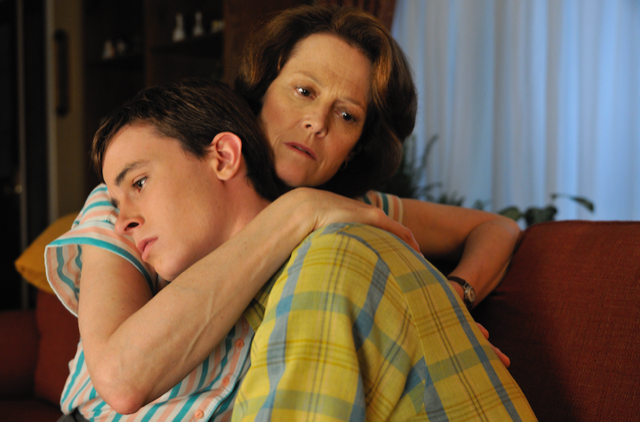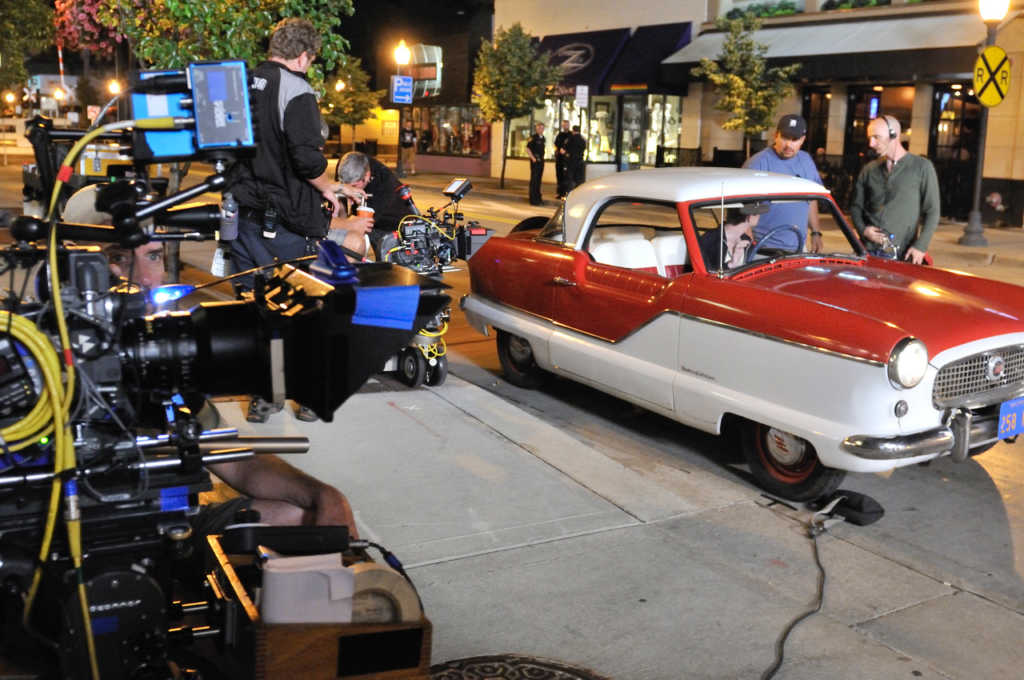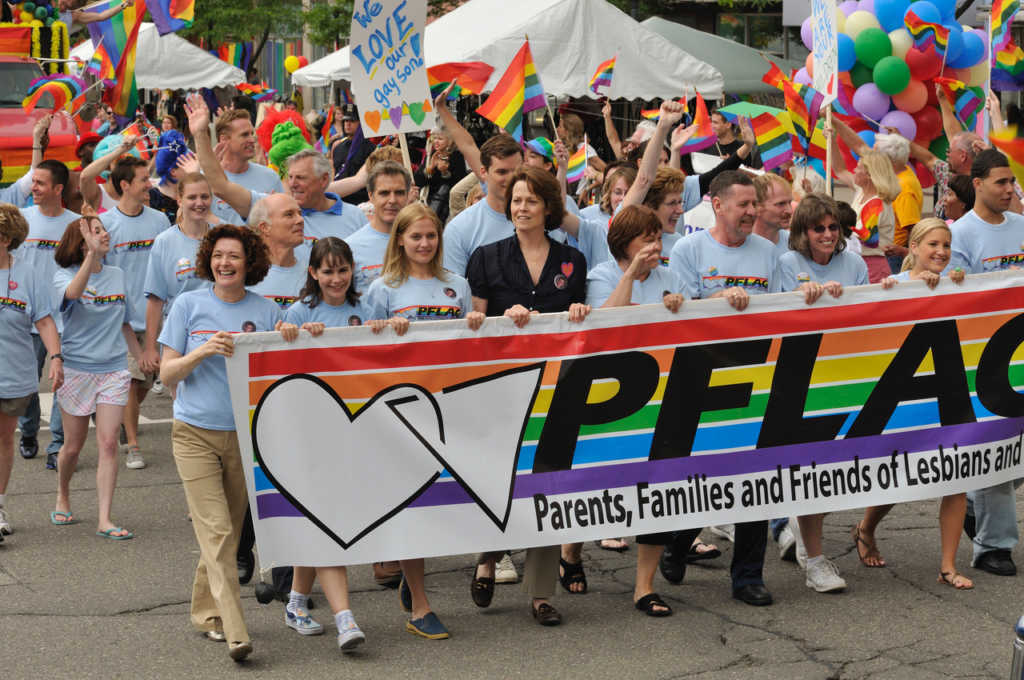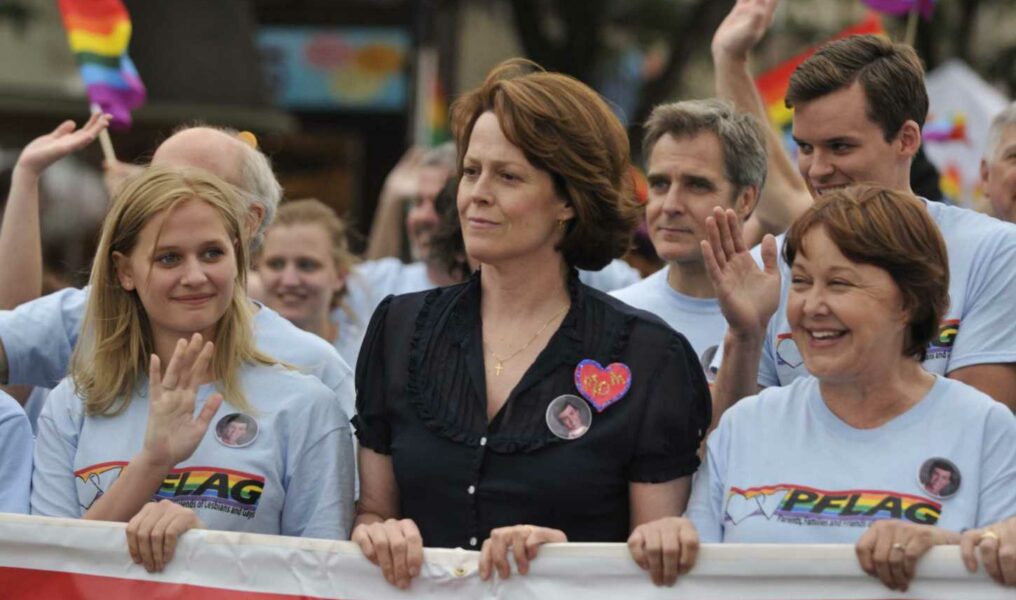Sigourney Weaver almost didn't make it to Michigan to film "Prayers for Bobby." In fact, the star of "Ghostbusters" and "Alien" didn't think she could even make time to shoot the TV drama, which has resonated deeply with LGBTQ+ audiences everywhere since it premiered on Lifetime in 2009.
At the time, the actress had another job, and her daughter was about to graduate from high school. But Weaver couldn't say no once she read the Lambda Literary Award-nominated book — a harrowing and inspiring true story, written by out journalist Leroy Aarons — and Katie Ford's script about the real-life Mary Griffith, a Christian woman who becomes a devout LGBTQ+ crusader after her gay teenage son, whom she once vehemently condemned, commits suicide. (Griffith died just last year at the age of 85.)
In addition to portraying Griffith, Weaver also co-produced "Prayers for Bobby" alongside executive producers Daniel Sladek, Chris Taaffe and David Permut, who had been trying to get the film made for 11 years before it finally aired on Lifetime.
"I just felt it was so important," Weaver told me when we spoke in June 2008, during a break from shooting. Though the movie is set in 1980s San Francisco, it features many familiar Metro Detroit locations: Pronto! and the United Methodist Church, both in Royal Oak; Ferndale High School; Backstreet nightclub in Detroit, and a Bloomfield home, the setting for the Griffith residence. The film's final scene takes place up and down Washington Avenue in Royal Oak, as Weaver's Mary leads a PFLAG parade alongside about 1,000 Michigan extras.
"Prayers for Bobby" has gone on to be screened globally, at festivals, conferences, universities and faith-based organizations. It was even, by invitation of European Union Parliament then-Vice President Ulrike Lunacek, screened by members of Parliament on International Day Against Homophobia in 2015. To this day, both PFLAG National and the Trevor Project consider the film a valuable educational tool. As for Weaver, in addition to receiving Emmy, Golden Globe and Screen Actors Guild nominations, she was honored with the Trevor Life Award from The Trevor Project for her participation in the film.
An encore presentation of "Prayers for Bobby" will be shown for Pride Month on Lifetime at 10 a.m. on Sunday, June 20. It is also available on demand for cable subscribers through the end of July.
Without her even saying it, it's clear the film is still important to the veteran actress, who tells me at the onset of our conversation that she's "really glad" we get to reconnect about the film 12 years after its premiere. During our interview, Weaver told Pride Source why she considers "Prayers for Bobby" one of the most significant films she's ever made and how Michigan "really gave the film a home."
It means a lot that you'd take time out to talk about this movie still, after all these years.
Well, unfortunately, it's still as relevant as ever. Maybe even more so during this weird year where they're trying to pass so many anti-LGBTQ laws. They need to see the movie. (Laughs.)
Well, this week in Michigan, Governor Gretchen Whitmer signed an executive order that will bar state or federal funds to be used for conversion therapy in the state.
I read that. I'm so shocked that conversion therapy was being done in Michigan, which I think of as a very (laughs) sophisticated place. And even state funds were being used to conduct conversion therapy against teenagers, which is heartbreaking because I believe that the attempted suicide rate for kids who have been through that is higher, understandably. I think that after this COVID year where there was so much more isolation for LGBTQ youth, it's really the opposite of what one would hope would happen this year.
The Governor's executive order, though, is a positive step forward. Hopefully, other leaders follow in her footsteps.
Very positive. I hope it's being picked up all over, you know? Because good for her. Start banning conversion therapy instead of banning LGBTQ youth from sports teams and bathrooms.

I had such an emotional response the first time I saw "Prayers for Bobby." I rewatched it two nights ago and felt it just the way I felt it 12 years ago, which is to say that I was just in a puddle of tears the whole time. As a gay man, it hurts so much to see a young gay person in pain.
The irony is that when Mary Griffith was conducting her campaign against her own child, she was also in terrible pain. So this whole business of trying to keep people from being who they are is such a pointless exercise for everybody. I mean, part of the point of doing this movie for me was this idea that you watch it as a family, and it just prepares you to tell your story to your parents.
I bet when you made the movie 12 years ago, you didn't realize that you'd be talking about it every June for Pride Month, but it sure seems that way.
Yeah, and I'm glad because I think it's taken the producers quite a bit of work to continue to get the movie out there. It wasn't shown enough when we first did it, and I think they're constantly working on showing it all over the world. Every time Pride Month rolls around, I wish we could show it more than once, but at least it's playing on Lifetime and that's great. I don't know if it's available on Netflix or on any of those other venues. I've never looked. Do you know?
It seems to be available on YouTube, at least.
It should be available on Prime, that's ridiculous.

You thanked the state of Michigan in your GLAAD acceptance speech when the movie won for Outstanding TV Movie or Miniseries. Why was Michigan important to the filming of this movie for you?
Michigan really gave the film a home, and Michigan is an interesting place because I feel like it has very strong political sides there. And what I felt about the production of "Prayers for Bobby" is that we had a lot of crew from Michigan. We were in a very kind of upscale neighborhood shooting, and I felt everyone that I came across seemed to be there for a personal reason, fighting for the same thing.
You know, a crew member would have a member of the family or a good friend who was LGBTQ. Everyone was trying to make a movie that would help in some way. And I felt that also about just where we were in Michigan, even though it has this reputation, I guess, of being a very corporate state. It's such a complex place, Michigan. (Laughs.) We just had the best reception there. I imagine there were states that probably didn't want us to shoot there. And I think it would still be the same, unfortunately.
Did shooting in Midwestern Michigan towns that aren't all that big provide the film with benefits that maybe shooting in a big city sprawl like LA or Atlanta couldn't have?
Oh gosh, yes. I felt that very much. I felt that it contributed to the intimacy of the story. Here they were, this family that was so close, and Mary idealized family life and she felt that Bobby's being gay went against that. But I hope that other mothers who are conservative would have a different outlook, 'cause it seems to me that even all across the political spectrum, people are wanting more recognition of LGBTQ problems and solutions. I think that's across the board because I see these state legislatures trying to pass very punitive, insensitive laws against the LGBTQ community.

I remember being on the sidelines of the Pride parade scene that was shot in downtown Royal Oak. What stands out to you most about shooting that scene?
It was at the end of the shoot, and it was at the end of the film story for Mary. Mary's evolution was such a powerful thing. I think her being there was so healing for her, and it was so healing for any of us who watched the story: We can't save Bobby. We've lost Bobby. But there's all these Bobbys all around us, and so that's what Mary dedicated the rest of her life to.
I think the movie is still very, very relevant. I hope that more things are being made specifically about a young person coming out. I feel like there should be many more stories about even younger kids. I don't even know if they have after school specials anymore, but it's a very good subject for an after school special.
Daniel made a real effort to shoot in as many naturally gay environments as possible. How do you think that might have enhanced the film's authenticity and also the experience for you in this role?
There's one place that I can remember: the church where she goes (in Royal Oak), and I considered that a normal place. (Laughs.) I have to say, I've never been more terrified of playing a part. I just thought, "How am I ever going to do this? How am I going to turn myself into someone who has these ideas?" Luckily, there is something called acting that takes over (laughing). But as a mother it just broke my heart to read this story.
The amazing thing about what you've done with that role is that you've allowed the viewer to even sympathize with Mary, which is difficult for gay viewers like myself, watching somebody condemn their gay child. And yet, you come to an understanding of where Mary has come from and why she is the way she is.
I'm glad you feel that way. The day I spent with Mary was such a powerful experience, because her desire to make amends is much too small a concept. Her conversion into a person who sees people and accepts people for what they are, it was so profound, so you see someone who is blind but they're trying to find their way out of this thing. I guess that reminds me, especially during this very political time, not to demonize (laughs) the people who are behind these laws. It must be about fear and ignorance.
All we can do is continue to, in your case, put out these stories and articles about how things are changing and how much more needs to be done, and in my case I've just finished a movie called "Call Jane," which is about the group of women that came together in 1968 (the Jane Collective). They formed a sort of clandestine abortion service and ended up performing the abortions themselves and performed almost 12,000 abortions without losing a single patient. It was very clear to me when I read the script, even though it's not overt, that this woman was in a gay relationship. And, actually, the next woman I play in this miniseries in Australia, she also has a relationship.
Is she gay?
Well, that's not the focus, but her dearest friend is another woman. In fact, she only lives with women and takes care of women who've been the victims of domestic violence. A lot of these things are coming together, I think, in a very realistic and holistic way, and I've been noticing that scripts are sort of breathing differently. In my case, I felt like my character had the right to decide who she was, and part of who she was, was that she was in a relationship with another woman. There's an opening up of relationships in ways that I think, if we were making these stories 10 years ago, we just wouldn't have looked at in the same way. So I feel just tremendously hopeful that we're beginning to see just each other differently and trying to see the whole person and listen to how they speak about themselves.
You've done so many iconic movies, but when it comes to the impact of your work, where does "Prayers for Bobby" rank?
It's very high up there in terms of making a movie with a very specific endpoint, to make this movie for this community. To encourage them. To let them know that we're here for them. I think that I would put it in the top three.
I can never even remember what I've done when I get a question like this (laughing), but I would say I'm grateful to have had an opportunity to tell a story in a movie that was made for such an important purpose. That makes me very happy, to use my work and come together with other artists to put something out there that's going to make a difference for young people and their families around the world. There's nothing more powerful than that. That's what an actor dreams of: to make a difference with their work. And it's very gratifying to me to be able to talk to you. This year, I think, has been a bit shocking in terms of how much legislation there is out there, and yet, at the same time, I feel that things have opened up in the LGBTQ world. There's much more attention and compassion riveted on young people in this regard.
My hope is that every 10 years or so we get to check in and talk about "Prayers for Bobby" in the scope of the larger world. So next time we talk, hopefully a lot more will have changed for the LGBTQ+ community.
Well, let's not make it 10 years. I may not even be here. (Laughs.) Let's make it two.











